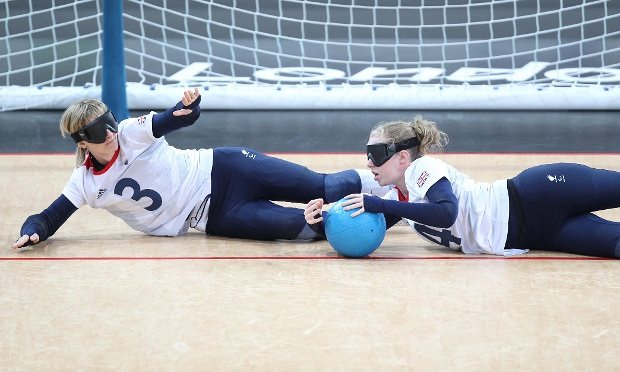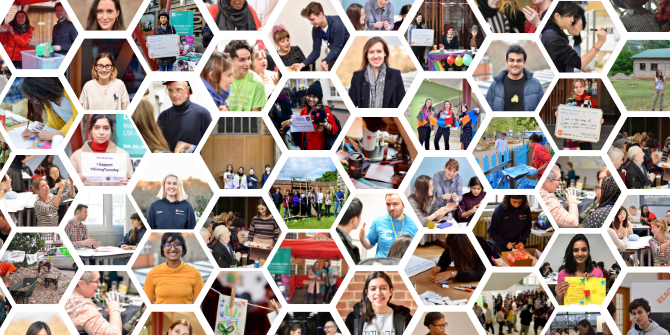
Jessica Luke is a Paralympian and she now works at Blind in Business. In this blog she talks about the challenges she’s faced finding a job:
I have a genetic eye condition called retinitis pigmentosa and I have around 2% remaining vision.
I have a first-class degree in languages and a distinction in my MA in technical translation. I have internship experience at the European Commission and also competed as a Paralympian in London 2012. But finding a job was one of the greatest challenges I have ever faced.
The job hunt began in March 2014. I knew how competitive the market had become but I felt quietly confident in my chances of finding work. I was naive. Vacancies, particularly graduate schemes, are oversubscribed with many highly qualified candidates. I found it difficult to stay positive when so many of my applications went without reply.
As someone with only a pinhole of remaining vision, the varied format of online application forms was tricky. I spent hours filling in data and trying to locate the correct textboxes. It was visually tiring to spend so much time in front of my laptop and careers websites were not always easy to navigate. Even so, I was determined to find work and submit well-researched applications. Still no interview.
Sometimes, I would fail pre-screening questions, such as ‘do you have a full driving licence?’ or ‘are you prepared to relocate?’ and was denied access to the application. One of the few things a blind person can’t do is drive a car. It is also difficult for someone with limited sight to relocate across the UK, potentially far from the support of family and friends.
I have around five degrees of vision, which means if I’m sitting a metre from you, looking at your left eye, I probably can’t see your right one. It takes longer to learn how to get around: I use what sight I have to avoid potential dangers and I miss most of what is around me. These more practical implications of a disability are often overlooked by employers.
I had less work experience on my CV than some candidates, because my free time at university was spent training and competing as an athlete for Great Britain. I also faced hurdles getting work experience as employers are less likely to make reasonable adjustments to the workplace for a temporary placement. With two thirds of visually impaired people of working age unemployed, I worry that employers may have a false view of how visual impairment affects my ability to work.
In my experience, graduate schemes were more prepared for applicants with disabilities and HR people were helpful with adaptations to psychometric tests. I had to prompt some employers though to make their tests accessible and, on one occasion, the places on my preferred scheme had already been filled by the time I was invited to interview. I learned to chase people.
In August 2014, a friend suggested that I get in touch with the charity Blind in Business, which helps visually impaired people to find work. I got some great advice on interviews and the assessment centre process from a former HR professional and a visually impaired manager at two large employers. This support gave me new motivation and made me feel less isolated in my search.
I was invited to my first assessment centre for my current employer in January 2015. Their HR team called me ahead of the day to talk through any concerns I might have, which was thoughtful of them. I’m glad that I was honest about the support I would need. I was able to use my laptop and was given the help that I needed discreetly, in a way that allowed me to perform like any other candidate. I was thrilled to be offered a place on the marketing graduate scheme a few days later.
Many people don’t realise that little things like introductions, getting coffee, and even finding a seat have their unique challenges when you don’t see well. Sometimes accidents happen; I met a blind interviewee who, wanting to impress, thrust out his hand to make sure that he didn’t miss the all-important introductory handshake. He knocked the interviewer’s coffee out of his hand and all over his suit. Employers usually try their hardest to make the adjustments that a disabled candidate might need but it’s easy to make assumptions where disability is concerned. And it would have been daunting to have been presented with a wedge of braille at an assessment centre, when I have no idea how to read it.
It would make life easier for visually impaired job hunters if the graduate application process were standardised, so that you only have to enter personal details, qualifications and work experience once. Form filling is very time consuming when you don’t see well. It would also help if there was a standard format for psychometric tests because it’s hard to know which adaptations are necessary or how much extra time you need when each test is different. Finally, employers should avoid making assumptions about disability support: it’s simpler and more effective to ask what someone needs.
Disabled and visually impaired job seekers should be honest about the challenges they face, be proactive about asking for reasonable adjustments and seek advice from disabled employment services. It takes a mixture of perseverance and resilience to keep the momentum going, but support and opportunities are out there.
Finally, I’d say remember to show the strength of character that a disability brings: it’s not easy living with a visual impairment, but you can have a degree, maybe you’ve travelled, played sport or run societies at university and sight loss is not going to hold you back.





